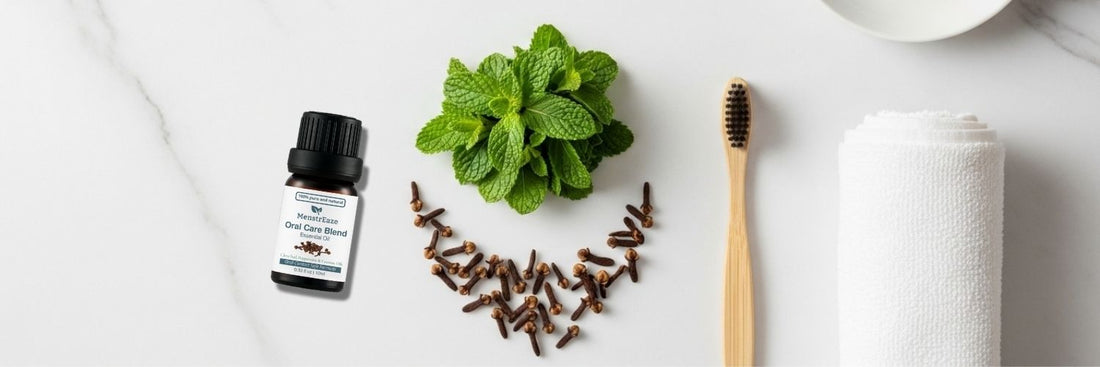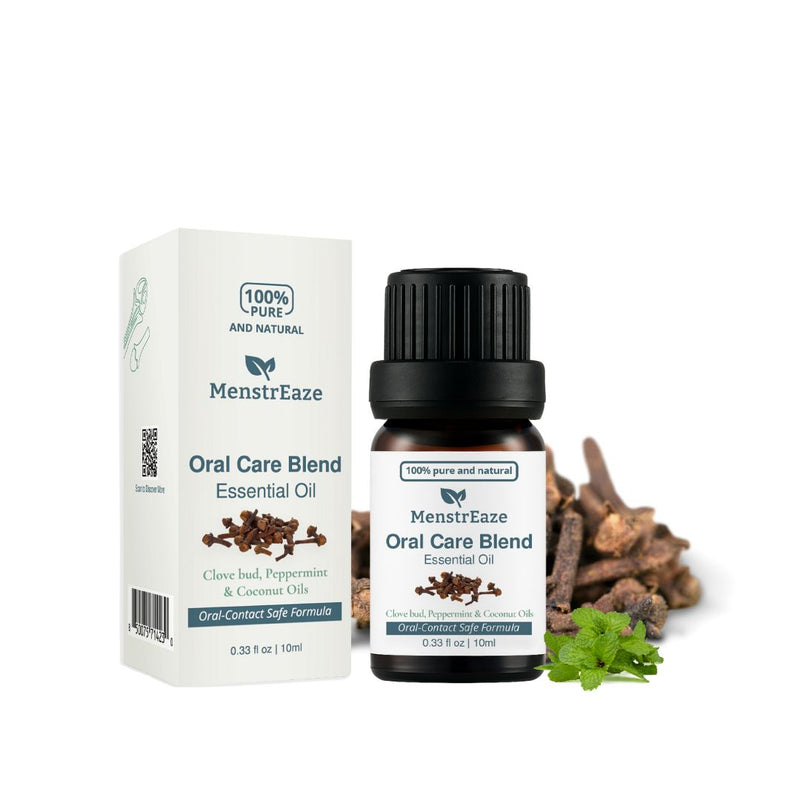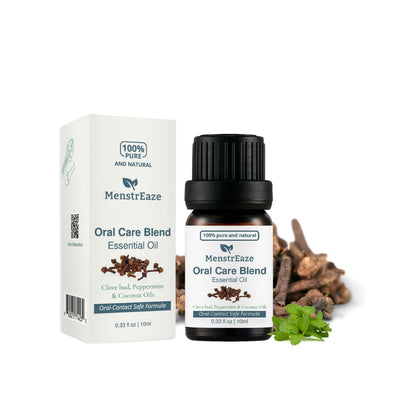Introduction: Understanding Gum Discomfort
Gum pain, irritation, and sensitivity are common oral discomforts that can significantly impact daily life, making eating, speaking, and even smiling a challenge. Many people seek gentle yet effective solutions to manage these uncomfortable sensations. While professional dental care is always paramount, nature offers a rich array of remedies that have been traditionally used to support oral health. Among these, the combination of clove oil and peppermint has emerged as a particularly promising duo for its soothing effects.
This blog post will delve into how this natural blend works to relieve gum pain, reduce inflammation, numb discomfort, and promote overall oral health. We’ll explore the unique properties of each essential oil and how their combined action creates a powerful, yet gentle, approach to managing gum irritation and sensitivity. For those new to natural remedies for oral care, understanding the science behind these potent plant extracts can open up a world of comfort and wellness, providing an accessible pathway to potentially find relief from gum discomfort with clove oil for gum pain.
Clove Oil: Nature's Oral Soother
Clove oil, derived from the dried flower buds of the Syzygium aromaticum tree, has been revered for centuries in traditional medicine systems across the globe for its remarkable therapeutic properties. Its distinctive warm, spicy aroma is easily recognizable, but it's the potent compounds within that make it a standout for oral care, particularly when it comes to soothing discomfort and promoting healing in the gums.
The Science Behind Clove Oil for Gum Pain
The primary active component in clove essential oil is eugenol, a phenolic compound responsible for much of clove's therapeutic efficacy. Eugenol is a natural analgesic, meaning it has pain-relieving properties. This is why clove for toothache has been a popular folk remedy for generations. Studies have shown that clove oil can exhibit significant anesthetic properties, with one comparative analysis noting its effectiveness in reducing pain perception during intraoral procedures [5]. This numbing effect is particularly beneficial for alleviating the immediate discomfort associated with gum pain and sensitivity.
Beyond its ability to numb, clove oil is also a powerful anti-inflammatory agent [2], [7], [8], [11]. Inflammation is a common underlying cause of gum pain and swelling, often resulting from bacterial irritation or injury. Eugenol's anti-inflammatory effects help to calm irritated tissues, which can visibly reduce redness and swelling, providing much-needed relief and supporting the natural healing process of the gums [7], [11]. The ability of clove oil to modulate inflammatory pathways contributes significantly to its soothing effects on oral tissues [9], [11].

Beyond Pain: Clove's Antimicrobial Benefits
Gum pain and irritation are often linked to the presence of bacteria in the mouth. A healthy oral microbiome is crucial for preventing issues like gingivitis and periodontitis, which can manifest as painful, inflamed gums. Clove oil's benefits extend far beyond pain relief, as it possesses strong antimicrobial properties, including antibacterial, antifungal, and even antiviral capabilities [1], [4], [6], [8], [11], [12], [14], [15], [17], [18], [20], [21], [22], [23], [24].
Its powerful antibacterial action helps to combat various oral pathogens that contribute to plaque formation and gum disease [4], [14], [15], [21], [22], [24]. This makes clove oil for tooth infection a frequently discussed natural remedy, though it's important to remember that it is a supportive measure, not a definitive treatment for established infections, which require professional dental intervention. By reducing the bacterial load, clove oil not only helps to alleviate existing irritation but also contributes to preventing future gum issues. Its antifungal properties are also noteworthy, helping to maintain a balanced oral environment and prevent the overgrowth of yeasts like Candida albicans, which can sometimes cause oral thrush and contribute to discomfort [12], [17]. The comprehensive antimicrobial profile of clove oil makes it a valuable component in a holistic approach to oral hygiene and maintaining healthy gums [23].
Peppermint: The Refreshing Partner
While clove oil addresses the core issues of pain and inflammation, peppermint essential oil, derived from the Mentha piperita plant, plays a crucial complementary role in a gum care blend. Peppermint is widely recognized for its invigorating scent and refreshing taste, but its benefits for oral health go deeper, providing both immediate comfort and ongoing support for a healthy mouth.
Cooling Comfort and Freshness
One of the most immediate effects of peppermint oil is its characteristic cooling sensation. This is primarily due to menthol, a compound found abundantly in peppermint, which activates cold-sensitive receptors in the skin and mucous membranes. For irritated or sensitive gums, this cooling effect can provide instant, soothing relief, helping to calm discomfort and create a more comfortable sensation in the mouth [23].
Beyond comfort, peppermint is a natural powerhouse for freshening breath. It effectively masks unpleasant odors and contributes to a clean, invigorating feeling in the mouth. This is not just a cosmetic benefit; fresh breath often indicates a healthier oral environment. Its refreshing qualities make oral hygiene routines more pleasant and encourage consistent use, which is key for long-term gum health.
Supporting Oral Health
Peppermint oil also contributes to overall oral health through its inherent properties. Like clove oil, peppermint has been noted for its potential antimicrobial activity [16], [23]. While not as potent an analgesic as clove oil, its ability to help inhibit the growth of certain oral bacteria contributes to a cleaner mouth and can indirectly support gum health by reducing the microbial factors that lead to irritation and inflammation. The traditional uses of peppermint in oral care have long recognized its role in maintaining a healthy and balanced oral microbiome [19], [23].
The combination of peppermint's cooling, freshening, and mild antimicrobial properties makes it an ideal partner for clove oil. It enhances the immediate sensory experience of the blend, making it more pleasant to use, while also providing its own set of therapeutic benefits that synergistically support the overall goal of promoting gum comfort and health.
The Synergy of Clove Oil and Peppermint: A Holistic Approach to Gum Health
The true power of using clove oil and peppermint together for gum pain lies in their synergistic relationship. Individually, each oil offers significant benefits for oral health; however, when blended, their properties complement and enhance one another, creating a more comprehensive and effective natural remedy for gum irritation and sensitivity.
Clove oil brings its strong analgesic and anti-inflammatory power, directly addressing the pain and swelling that often accompany gum issues [5], [7], [8], [11]. Its potent antimicrobial action works to reduce harmful bacteria, fungi, and even viruses that can contribute to gum disease and discomfort [1], [4], [6], [8], [11], [12], [14], [15], [16], [17], [18], [20], [21], [22], [23], [24]. This comprehensive antimicrobial effect is crucial for maintaining a healthy oral environment and preventing the progression of gum problems.
Peppermint, on the other hand, provides immediate symptomatic relief with its cooling and refreshing sensation. This menthol-rich oil helps to soothe the burning or throbbing pain of inflamed gums, while its refreshing aroma contributes to better breath and a cleaner feeling mouth [23]. Its own mild antimicrobial properties further support the work of clove oil, ensuring a broader spectrum of protection against oral pathogens [16], [23].
When combined, you get a blend that not only helps to numb discomfort and reduce inflammation but also actively works to improve the underlying oral hygiene. The analgesic and anti-inflammatory benefits of clove oil are complemented by peppermint's soothing coolness, making the application more comfortable. This blend can be particularly effective as a natural clove mouthwash or applied directly to affected areas, providing a multi-faceted approach to gum care. The refreshing taste and aroma of peppermint also make the blend more palatable for regular use, which is important for consistent oral health maintenance. This natural combination offers a gentle yet effective remedy that supports overall oral wellness, addressing both symptoms and contributing factors to gum irritation and sensitivity [19], [23].
How to Safely Use Clove Oil and Peppermint for Gum Pain
While clove oil and peppermint offer significant natural benefits for gum pain, it is crucial to use them safely and correctly, especially since they are potent essential oils. Proper dilution and application methods are key to maximizing their benefits while minimizing any potential irritation.
Dilution is Key: Importance of Carrier Oils
Essential oils, particularly potent ones like clove oil, should never be applied undiluted directly to the skin or mucous membranes, especially in the sensitive oral cavity. Undiluted application can cause irritation, burning, or sensitization. Always dilute clove and peppermint essential oils with a suitable carrier oil, such as fractionated coconut oil, almond oil, or olive oil, before applying them to your gums. A common dilution ratio for oral use is 1-2 drops of essential oil per teaspoon of carrier oil. This ensures that the beneficial compounds can work effectively without causing adverse reactions.
Application Methods
There are several ways to apply a diluted clove and peppermint blend for gum pain relief:
- Direct Application: For localized pain, mix 1-2 drops of the essential oil blend with a teaspoon of carrier oil. Dip a clean fingertip or a cotton swab into the mixture and gently dab it onto the affected gum area. Repeat as needed, typically a few times a day.
- As a Mouth Rinse/Mouthwash: To use as a clove mouthwash, add 2-3 drops of the diluted blend to half a glass of warm water (about 4-6 ounces). Swish the mixture around your mouth for 30-60 seconds, then spit it out. Do not swallow. This method is excellent for general gum soreness, maintaining overall oral hygiene, and freshening breath.
- Gentle Massage: After diluting, you can gently massage the oil mixture onto your gums with a clean fingertip. This can help improve circulation to the area and promote a soothing effect.
Always ensure your hands are clean before applying the blend to your mouth.
Important Precautions and When to See a Dentist
While natural remedies can be very supportive, they are not a substitute for professional dental care. Here are some critical precautions:
- Patch Testing: Before widespread use, apply a tiny amount of the diluted blend to a small, inconspicuous area of your gum or inner arm to check for any sensitivity or allergic reaction.
- Do Not Ingest: While some essential oils are safe for internal use in highly diluted forms under professional guidance, it is generally recommended to avoid swallowing essential oil blends when used for oral care, especially for beginners. Always spit out any rinse or excess oil after use.
- Pregnancy and Children: If you are pregnant, nursing, or considering using essential oils for children, it is crucial to consult a healthcare provider or qualified aromatherapist first.
- Existing Medical Conditions/Medications: If you have any underlying medical conditions or are taking medications, consult your doctor or dentist before incorporating essential oils into your routine.
- Not a Cure for Infections: While clove oil has antimicrobial properties that can help manage bacteria associated with oral issues, it is not a cure for a severe clove oil for tooth infection or other significant dental problems. If you suspect an infection (e.g., persistent severe pain, fever, swelling, pus), seek immediate professional dental attention.
- When to See a Dentist: If gum pain persists, worsens, or is accompanied by other symptoms like fever, bleeding, loose teeth, or significant swelling, it is imperative to consult your dentist. These symptoms could indicate a more serious underlying issue that requires professional diagnosis and treatment. Natural remedies can offer comfort and support, but they should be part of a comprehensive oral health plan developed with your dental professional.
Product Spotlight: Oral Care Blend for Teeth & Gums with Clove Bud, Peppermint & Coconut Oil
For those seeking a convenient and effective way to harness the benefits of clove and peppermint for gum pain, the Oral Care Blend for Teeth & Gums with Clove Bud, Peppermint & Coconut Oil offers a ready-to-use solution. This 10 ml blend is thoughtfully formulated to support daily oral hygiene and provide soothing relief for gum discomfort.
This natural essential oil formula combines three powerful ingredients:
- Clove Bud Essential Oil: Steam-distilled and rich in eugenol, it's included to help support toothache relief and overall oral wellness.
- Peppermint Essential Oil: Delivers a clean, cooling sensation that naturally freshens breath.
- Fractionated Coconut Oil: A gentle carrier oil with light antibacterial properties, it nourishes and protects, ensuring the blend is oral-contact safe and non-stinging for direct use on teeth and gums.
The benefits of this blend align perfectly with the needs of those experiencing gum irritation: it soothes tooth & gum discomfort by helping to calm irritation and ease minor aches, promotes gum health through the supportive properties of clove oil for oral hygiene, and freshens breath naturally with peppermint. Additionally, the coconut oil helps to balance the oral microbiome, contributing to long-lasting freshness by fighting odor-causing bacteria.
Designed for comfortable, mess-free application, this travel-ready 10 ml bottle is 100% natural and clean, free from parabens, SLS, synthetic fragrances, and preservatives. It's also Non-GMO, Vegan, Natural, and Cruelty-Free. For gum and tooth relief, simply apply 1 drop to the affected area with a clean fingertip or cotton swab. It can also be mixed with warm water as a natural mouth rinse or dabbed onto gums or tongue for instant breath freshening. If you're wondering where to buy clove oil for toothache that is pre-diluted and safe for oral use, this product offers a convenient option.
As with all oral care products, it's wise to check for sensitivity to essential oils, especially peppermint. While this blend is designed for oral contact, it is always recommended to consult a healthcare provider before use if you are under 18, pregnant, trying to conceive, nursing, taking medication, or managing a medical condition. You can explore this product further and find purchase information by visiting the Oral Care Blend for Teeth & Gums product page.
Conclusion: Embracing Natural Solutions for Oral Wellness
Gum pain, irritation, and sensitivity can be persistent and uncomfortable, but natural remedies like a blend of clove oil and peppermint offer a gentle yet powerful approach to finding relief and supporting overall oral health. Clove oil provides a potent combination of numbing, anti-inflammatory, and antimicrobial actions, while peppermint contributes cooling comfort and refreshing qualities. Together, they form a synergistic partnership that can help reduce discomfort, calm inflamed tissues, and maintain a healthier oral environment.
By understanding how to safely and effectively use these natural extracts, such as through proper dilution and application methods like a soothing clove mouthwash or targeted topical application, individuals can integrate them into their daily oral hygiene routine. While natural remedies like clove oil for gum pain can be a valuable addition to your self-care practices, it is crucial to remember that they are complementary tools. Always prioritize professional dental care for persistent or severe symptoms, and use natural remedies as a supportive measure to promote a healthier, more comfortable smile. Embracing these natural solutions can empower you to take a more holistic approach to your oral wellness journey.







